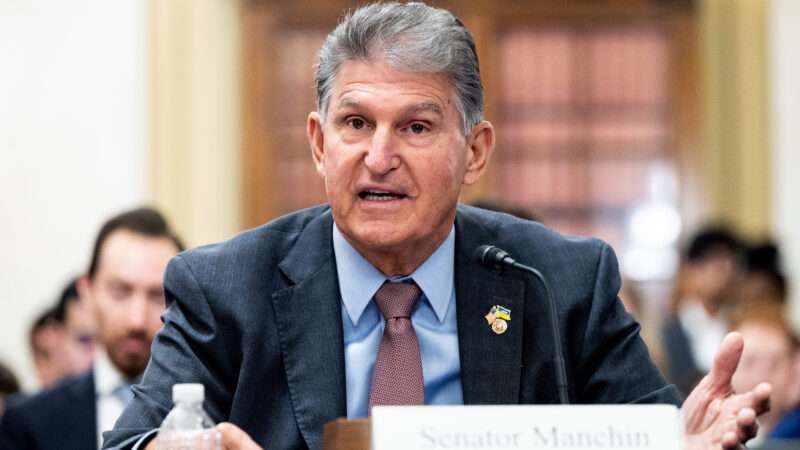
There's a growing bipartisan consensus that the U.S. spends too much time and too much money approving new infrastructure projects.
A side deal worked out by Sen. Joe Manchin (D–W.Va.), Democratic congressional leaders, and the White House as part of their 'Inflation Reduction Act' addresses this problem by attempting to streamline environmental reviews mandated by the National Environmental Policy Act (NEPA).
The thrust of the reforms is in the right direction, but some advocates of NEPA reform say the available details paint the Manchin deal as too tepid to really combat the law's awesome power to delay new infrastructure.
"They're in the right direction but it still feels too small ball and piecemeal," says Eli Dourado, a senior research fellow at the Center for Growth and Opportunity.
Enacted in 1970, NEPA requires federal agencies to study the environmental effects of their actions, whether funding a new highway or issuing a permit for a new power plant. That might seem reasonable enough. But over the decades, the length of these studies and the time agencies take to complete them has grown immensely. Environmental impact statements (the most intensive form of NEPA review) take 4.5 years on average and run over 650 pages.
The law also gives third parties ample opportunity to file complaints or sue over supposedly inadequate agency studies, which can drag things out even longer.
The purpose of the law is to protect the environment, yet critics argue that NEPA has become a net negative for the environment by stretching out approvals of the new, cleaner energy infrastructure of the kind that the Inflation Reduction Act would fund. If approving a new nuclear reactor takes decades, people will continue to get their power from existing coal-fired power plants.
A summary of the agreement obtained by the Washington Post earlier this week includes a raft of ideas to speed NEPA-mandated reviews along.
They include setting maximum two-year timelines for review of major projects and a year for lower-impact projects. If a federal court, as part of NEPA litigation, orders an agency to redo a study, agencies would have 180 days to get the job done.
The idea of setting timelines for NEPA review is an oft-proposed reform. The Trump administration adopted such timelines as part of its regulatory tweaks to NEPA. While throwing out most of those reforms last year, the Biden administration kept the timelines in place.
The trouble, says Dourado, is that even "if you give an agency a timeline, they blow right through deadlines all the time and it's hard to enforce."
Project sponsors waiting on the agency to issue their approvals often lack the standing to sue over delays. Even if sponsors could sue, there's no guarantee that courts would require agencies to speed things along.
"Even if you did get in front of a court, judges are going to enforce NEPA. If they decide if a document is incomplete in some way, or is deficient in any way they could very well send it back," says Dourado.
A few other ideas included in Manchin's deal might be more impactful. It proposes expanding the number of projects that can be eligible for vetting by the Federal Permitting Improvement Steering Council, which coordinates the NEPA reviews of multiple agencies when they're all required to sign off on the same project.
Sen. Rob Portman (R–Ohio), writing in Barron's in 2021, noted that projects covered by the council managed to get through environmental review in just 2.5 years on average, as opposed to the typical 4.5 years. The council has approved roughly 30 of the 63 projects that are eligible for its review since it was created in 2015.
Baruch Feigenbaum, a transportation researcher with the Reason Foundation (which publishes this website) says better agency coordination on NEPA review can speed up permitting when the agencies themselves are committed to improving the process. But it doesn't stop willful foot-dragging.
"You can come up with this provision but you can't force federal agencies to go faster," he says.
Dourado says the most promising idea in the Manchin deal would be expanding the number of 'categorical exemptions,' which would allow agencies to sign off on projects without having to prepare either environmental impact statements or slightly less onerous environmental assessments.
Manchin said Monday that his permitting reforms had the backing of Senate Leader Chuck Schumer (D – N.Y.), House Speaker Nancy Pelosi (D–Calif.), and the Biden Administration.
Some Democrats, citing environmental concerns, have already expressed uneasiness with the compromise. The White House has also been rather fickle on NEPA reform, at times acknowledging the need for changes while also rolling back the Trump administration's streamlined regulations.
In theory, it should be possible to get some Republican lawmakers to vote for permitting reform. Folks like Sen. Mike Lee (R–Utah) have long proposed even more sweeping changes to NEPA.
The odds of that don't seem particularly promising.
At a press conference on Tuesday, Sen. Shelley Moore Capito (R–W.Va.) said she was "skeptical" of the deal worked out by Manchin and Democratic leaders, reports the Register-Herald. She called for him to support a resolution nullifying the White House's NEPA changes and to commit to putting up permitting reform for a vote before the Inflation Reduction Act.
For advocates of sweeping reform, it's obviously frustrating that even Manchin's marginal reforms to the law might not prove politically feasible.
On the other hand, the failure of marginal reform maintains the pressure on Congress to do the kinds of comprehensive NEPA reform people on the left and right agree is necessary.
"I am concerned that something along these lines will pass and everyone will conclude that permitting reform is done," says Dourado. The Manchin deal is "not anywhere near the magnitude that we need to actually make our federal bureaucracy capable of making decisions."
The post Joe Manchin Strikes a Deal To Fix Antiquated Environmental Review Regulations. Will It Do Any Good? appeared first on Reason.com.







